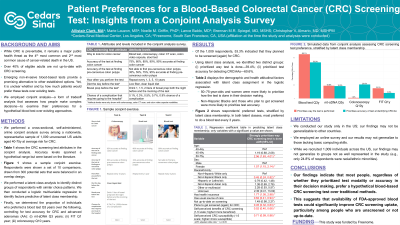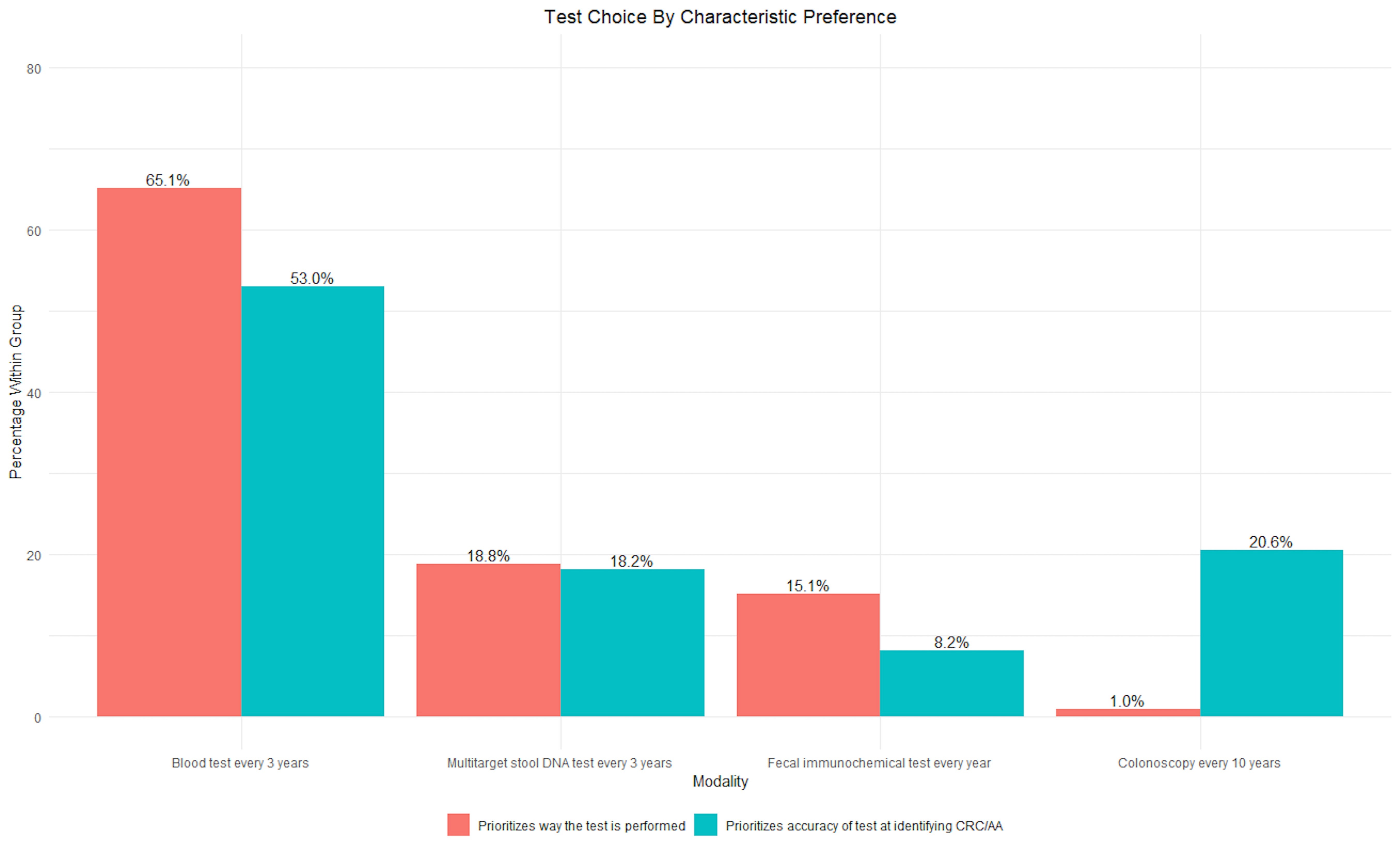Tuesday Poster Session
Category: Colorectal Cancer Prevention
P3851 - Assessing Patient Preferences for Blood-Based Colorectal Cancer (CRC) Screening Tests: Insights from a Conjoint Analysis with Over 1,000 People in the US
Tuesday, October 29, 2024
10:30 AM - 4:00 PM ET
Location: Exhibit Hall E

Has Audio
- AC
Allistair Clark, MA
Cedars-Sinai Medical Center
Los Angeles, CA
Presenting Author(s)
Allistair Clark, MA1, Marie Lauzon, MS1, Noelle M. Griffin, PhD2, Lance Baldo, MD2, Brennan Spiegel, MD, MSHS1, Christopher Almario, MD1
1Cedars-Sinai Medical Center, Los Angeles, CA; 2Freenome, South San Francisco, CA
Introduction: Over one-third of people in the US are not up-to-date with CRC screening, and emerging blood-based tests offer a promising addition to existing options. Here, we used conjoint analysis to quantify the proportion of people who would prefer a hypothetical blood test over traditional approaches (eg, fecal immunochemical test [FIT], multitarget stool DNA test [mt-sDNA], colonoscopy).
Methods: We conducted a conjoint analysis survey in a nationally representative sample of average risk people aged 40-75 years who were not up-to-date with CRC screening. The conjoint determined the relative importance of test attributes in their decision making (eg, modality [blood test, stool test, colonoscopy, etc.], test frequency, accuracy at detecting CRC and advanced adenomas [AA], bowel prep, etc.). We also used latent class analysis to identify groups with similar decision-making profiles. Finally, we performed simulations with the conjoint data to estimate the proportion of people who would prefer a hypothetical blood test Q3 years over existing test options: FIT Q1 year, mt-sDNA Q3 years, colonoscopy Q10 years.
Results: Overall, 1,009 participants across the US completed the online survey. Using latent class analysis, we identified 2 distinct groups: (i) prioritized how the test is done—39.4%; (ii) prioritized accuracy of the test at detecting CRC/AAs—60.6%. The Table shows results from the multivariable logistic regression; 50-75 year-olds and women were more likely to prioritize how the test is done in their decision making. Conversely, non-Hispanic Blacks and those who plan to get screened were more likely to prioritize accuracy of the test. The Figure shows participants’ preferred tests stratified by latent class assignment. Among participants who prioritized the way the test is done in their decision making, most preferred a blood test Q3 years (65.1%), followed by mt-sDNA Q3 years (18.8%), FIT Q1 year (15.1%), and colonoscopy Q10 years (1.0%). For the group that prioritized test accuracy, most people also preferred the blood test (53.0%), followed by colonoscopy (20.6%), mt-sDNA (18.2%), and FIT (8.2%).
Discussion: Our findings indicate that most people, regardless of whether they prioritized test modality or accuracy in their decision making, prefer a hypothetical blood-based CRC screening test over traditional methods. This suggests that availability of FDA-approved blood tests could significantly improve CRC screening uptake, particularly among people who are unscreened or not up-to-date.

Note: The table for this abstract can be viewed in the ePoster Gallery section of the ACG 2024 ePoster Site or in The American Journal of Gastroenterology's abstract supplement issue, both of which will be available starting October 27, 2024.
Disclosures:
Allistair Clark, MA1, Marie Lauzon, MS1, Noelle M. Griffin, PhD2, Lance Baldo, MD2, Brennan Spiegel, MD, MSHS1, Christopher Almario, MD1. P3851 - Assessing Patient Preferences for Blood-Based Colorectal Cancer (CRC) Screening Tests: Insights from a Conjoint Analysis with Over 1,000 People in the US, ACG 2024 Annual Scientific Meeting Abstracts. Philadelphia, PA: American College of Gastroenterology.
1Cedars-Sinai Medical Center, Los Angeles, CA; 2Freenome, South San Francisco, CA
Introduction: Over one-third of people in the US are not up-to-date with CRC screening, and emerging blood-based tests offer a promising addition to existing options. Here, we used conjoint analysis to quantify the proportion of people who would prefer a hypothetical blood test over traditional approaches (eg, fecal immunochemical test [FIT], multitarget stool DNA test [mt-sDNA], colonoscopy).
Methods: We conducted a conjoint analysis survey in a nationally representative sample of average risk people aged 40-75 years who were not up-to-date with CRC screening. The conjoint determined the relative importance of test attributes in their decision making (eg, modality [blood test, stool test, colonoscopy, etc.], test frequency, accuracy at detecting CRC and advanced adenomas [AA], bowel prep, etc.). We also used latent class analysis to identify groups with similar decision-making profiles. Finally, we performed simulations with the conjoint data to estimate the proportion of people who would prefer a hypothetical blood test Q3 years over existing test options: FIT Q1 year, mt-sDNA Q3 years, colonoscopy Q10 years.
Results: Overall, 1,009 participants across the US completed the online survey. Using latent class analysis, we identified 2 distinct groups: (i) prioritized how the test is done—39.4%; (ii) prioritized accuracy of the test at detecting CRC/AAs—60.6%. The Table shows results from the multivariable logistic regression; 50-75 year-olds and women were more likely to prioritize how the test is done in their decision making. Conversely, non-Hispanic Blacks and those who plan to get screened were more likely to prioritize accuracy of the test. The Figure shows participants’ preferred tests stratified by latent class assignment. Among participants who prioritized the way the test is done in their decision making, most preferred a blood test Q3 years (65.1%), followed by mt-sDNA Q3 years (18.8%), FIT Q1 year (15.1%), and colonoscopy Q10 years (1.0%). For the group that prioritized test accuracy, most people also preferred the blood test (53.0%), followed by colonoscopy (20.6%), mt-sDNA (18.2%), and FIT (8.2%).
Discussion: Our findings indicate that most people, regardless of whether they prioritized test modality or accuracy in their decision making, prefer a hypothetical blood-based CRC screening test over traditional methods. This suggests that availability of FDA-approved blood tests could significantly improve CRC screening uptake, particularly among people who are unscreened or not up-to-date.

Figure: FIGURE. Data from simulations using conjoint analysis data assessing participants’ preferred CRC screening test, stratified by latent class assignment (prioritizes way the test is done [n=398] or accuracy of test at detecting CRC/AAs [n=611]). In both groups, most participants preferred to do a blood test every 3 years over traditional approaches.
Note: The table for this abstract can be viewed in the ePoster Gallery section of the ACG 2024 ePoster Site or in The American Journal of Gastroenterology's abstract supplement issue, both of which will be available starting October 27, 2024.
Disclosures:
Allistair Clark indicated no relevant financial relationships.
Marie Lauzon indicated no relevant financial relationships.
Noelle Griffin: Freenome Holdings Inc – Employee. Pfizer Inc – Employee.
Lance Baldo: Freenome – Employee, Stock Options.
Brennan Spiegel: Freenome – Grant/Research Support. Vibrant Advisory Board – Advisory Committee/Board Member.
Christopher Almario: Exact Sciences – Consultant. Freenome – Grant/Research Support.
Allistair Clark, MA1, Marie Lauzon, MS1, Noelle M. Griffin, PhD2, Lance Baldo, MD2, Brennan Spiegel, MD, MSHS1, Christopher Almario, MD1. P3851 - Assessing Patient Preferences for Blood-Based Colorectal Cancer (CRC) Screening Tests: Insights from a Conjoint Analysis with Over 1,000 People in the US, ACG 2024 Annual Scientific Meeting Abstracts. Philadelphia, PA: American College of Gastroenterology.
